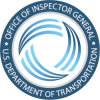Our Objective(s)To inform FHWA's guidance for preventing and detecting anticompetitive practices. Specifically, we (1) assessed competition in procurement for Federal-aid highway projects using statistical methods, (2) provided estimates of the effects on contract costs when certain anticompetitive practices occur, and (3) identified opportunities to improve FHWA's guidance for preventing and detecting anticompetitive practices.
Why This AuditFederal law generally requires States to award contracts for Federal-aid highway projects through competitive bidding. However, concerns about anticompetitive bidding practices in highway procurements have existed for decades. Because of the importance of competition in highway procurement and the low number of studies that have attempted to assess it, we undertook this audit.
What We FoundOur analyses found significant indications of potential complementary bidding on highway procurements.
At least a third of the contracts we analyzed using machine learning in Florida, Georgia, North Carolina, New Jersey, Pennsylvania, and South Carolina were potentially affected by complementary bidding.
Our conservative, econometric method also flagged significant potential complementary bidding in most States we examined, affirming the machine learning results.
Contracts identified as potentially affected by complementary bidding had higher costs, but separate analysis of firms in flagged pairs found limited evidence of their affecting costs.
We estimated that the costs of flagged contracts ranged from an average of 5.2 percent to 10.2 percent higher, depending on the State, than for comparable potentially competitive contracts.
Cumulatively, these estimated cost increases amount to $1.19 billion (in 2021 dollars), or a 6.9 percent cost increase in the Federal-aid highway contracts flagged by our analyses across the six States.
While FHWA has improved its guidance for preventing anticompetitive practices, our analysis shows a more systematic approach to detection is needed.
FHWA's guidance during our review period did not adequately support State DOTs' prevention or identification of anticompetitive practices.
Although improved, FHWA's current guidance continues to lack explicit direction for frequent, regular, and systematic analysis.
RecommendationsWe made 1 recommendation to improve State DOTs' capabilities to detect and mitigate anticompetitive bidding.


